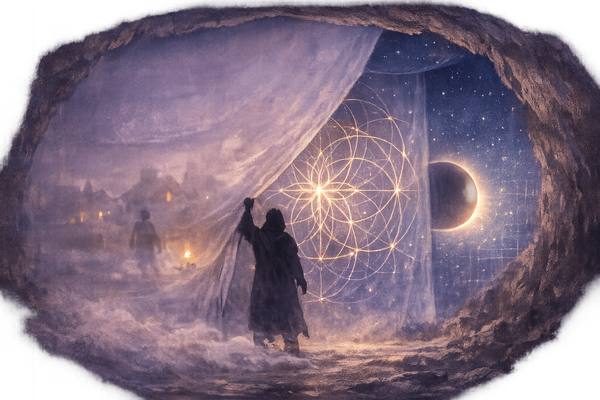Everyday ESP
Explore how everyday ESP influences your decisions and relationships, revealing the hidden guidance of intuition in daily life.

Ever felt like you “just knew” something before it happened? That quiet nudge, the sudden thought of someone before they call, or the urge to take a different route home - these aren’t coincidences. They might be glimpses of extrasensory perception (ESP), subtle signals from beyond the five senses.
ESP shows up in daily life as gut feelings, vivid dreams, or moments of clarity. Think of it as your inner compass, guiding decisions when logic falls short. From business leaders trusting intuition to athletes relying on instinct, this ability is more common than you might think. Studies even show 32% of U.S. adults report having psychic experiences.
Recognizing and trusting these moments can reshape how you approach relationships, career choices, and challenges. By tuning into your intuition through mindfulness, journaling, or quiet reflection, you can strengthen this skill and align with life’s deeper layers.
Your intuition is already active - it’s about learning to listen. Ready to explore the signals whispering beneath the surface?
Jose Silva's Everyday ESP: A New Way of Living by Jose Silva · Audiobook preview
How to Spot Everyday ESP
ESP, or extrasensory perception, often blends seamlessly into the fabric of our daily lives. These moments might seem like mere coincidences, but they could be subtle nudges from your intuition. Learning to recognize these instances and trust your inner signals can shift how you move through the world. Let’s explore some everyday examples that might already be part of your experience.
Common Examples of ESP in Daily Life
ESP often shows up in the most ordinary moments, catching us off guard with its accuracy. For instance, have you ever known who was calling before you even looked at your phone? This kind of certainty, while fleeting, can feel uncanny.
Another familiar experience is déjà vu - that strange sense of having lived through a moment before, even when you know it’s impossible. It’s as if time momentarily folds in on itself, offering a glimpse of something beyond the surface.
Then there’s the ability to sense outcomes before they unfold. Perhaps you hesitate before accepting a job offer, only to later discover the company was in financial trouble. Or maybe you feel an inexplicable pull to take a different route home and later learn there was an accident on your usual path.
According to a 2023 Gallup poll, 32% of U.S. adults report having had a "psychic" or intuitive experience at least once. This points to how common these moments really are. The challenge isn’t whether they happen - it’s learning to notice them when they do. Often, these experiences feel so natural that they’re brushed off as lucky guesses or fleeting thoughts .
Physical and Emotional Signs of Intuition
Intuition doesn’t just show up in external events - it also speaks through your body and emotions. Your physical sensations can often clue you in before your logical mind catches up. For example, gut feelings are more than just figures of speech. They might manifest as a fluttery sensation, a sense of warmth, or even a tightness in your stomach.
Other physical signals include tingling sensations along your arms or the back of your neck. Some people even report sudden chills in warm environments or a noticeable shift in how light or heavy they feel in certain situations.
Emotionally, intuitive insights are often accompanied by a calm, steady clarity. This is different from the jittery urgency of anxiety. You might feel an unshakable urge to act - or not act - paired with a sense of clarity that cuts through mental clutter. Interestingly, these signals tend to feel neutral and peaceful, even when the message they carry is difficult. A 2019 study published in Frontiers in Psychology found that people who practice mindfulness report a 23% higher frequency of intuitive experiences. This suggests that cultivating awareness can sharpen your ability to notice these subtle cues.
How to Tell Intuition from Fear or Overthinking
Understanding intuition also means knowing how to separate it from fear or overthinking. Genuine intuition feels calm, clear, and resolute, while fear-based thoughts are often frantic, repetitive, or overwhelming. Intuitive insights tend to arrive fully formed, like a sudden download of understanding. In contrast, anxious thoughts loop endlessly without resolution.
True intuition provides guidance without creating panic. Even when the message feels urgent, it carries a sense of calm direction. Overthinking, on the other hand, narrows your focus and often leaves you feeling stuck. Interestingly, intuitive sparks often arise in quiet moments - while you’re washing dishes, taking a shower, or strolling in nature.
One way to strengthen your connection to intuition is by tracking your hunches over time. Pay attention to which ones feel calm and complete versus those that are emotionally charged. Over time, you’ll notice patterns that help you distinguish accurate insights from worry or bias. By tuning into these signals, even the most mundane moments can take on a deeper, more meaningful resonance.
Building Your Intuitive Skills
Tapping into your intuitive abilities is like strengthening a muscle - it requires consistent practice and the right approach. Everyday experiences of extrasensory perception (ESP) can serve as your starting point, but refining these skills involves tuning into subtle signals and cultivating habits that enhance your inner awareness.
Daily Practices to Develop Intuition
A solid foundation for intuition begins with reflective journaling. Each day, jot down your initial impressions and gut feelings - whether it’s about a person you’ve just met, a decision at work, or a sudden urge to change your plans. Over time, you'll notice patterns in how your instincts align with reality.
Another powerful tool is dream journaling. Keep a notebook by your bed and write down any fragments, emotions, or symbols from your dreams as soon as you wake up. Dreams often process information your conscious mind overlooks. As Sigmund Freud once said:
"The interpretation of dreams is the royal road to a knowledge of the mind's unconscious activities".
Recurring themes or symbols in your dreams might reveal insights about challenges or decisions you’re grappling with.
Mindfulness techniques help you clear mental clutter and become more attuned to intuitive signals. A simple body scan - starting from your toes and moving upward - can reveal physical sensations like tension or warmth, particularly in your gut area, which is often a hotspot for intuitive cues.
For a playful approach, try the rapid-fire intuition game. Shuffle a deck of cards and, without peeking, guess whether each card will be red or black. Trust your first instinct. This exercise helps you build confidence in your immediate impressions.
Spending time in nature can also unlock intuitive insights. Dedicate 15–20 minutes outdoors without any distractions, observing the world around you. Whether it’s the movement of clouds, the rustling of leaves, or the flight of a bird, allow these natural elements to guide your thoughts. Often, nature provides subtle metaphors or symbols that resonate with your current situation.
Once you’ve established these habits, take the time to document and review your intuitive moments. This process not only strengthens your trust in your inner voice but also helps you identify when and how your intuition speaks most clearly.
Making Space for Intuition in a Noisy World
In today’s overstimulated world, carving out mental space is essential for hearing your inner voice. As Hortense le Gentil, author of Aligned: Connecting Your True Self with the Leader You're Meant to Be, explains:
"To make room for your intuition and stay connected with your aligned self, you need to reclaim some mental space".
One way to do this is by creating distraction-free zones. Start your day with 20 minutes of quiet time before diving into emails or social media. Use this window for reflection, light stretching, or simply sitting in stillness. This practice allows your mind to process overnight insights and sets a calm tone for the day.
"Silence allows your mind to wander, to explore those less-traveled neural pathways without the risk of being pulled back to the well-trodden roads of daily distractions".
Incorporate brief pauses throughout your day. Even two minutes of deep breathing between tasks can create the mental clarity needed for intuitive insights to surface.
The silent observer exercise is another effective method. Find a quiet spot and spend 10 minutes simply noticing your thoughts, emotions, and physical sensations without judgment. Avoid problem-solving during this time; instead, let your mind wander freely. Often, solutions or ideas emerge when you stop actively searching for them.
Decluttering your physical environment can also have a profound impact. A tidy workspace or bedroom reduces mental noise, making it easier to notice subtle intuitive cues. Establishing consistent sleep routines and limiting screen time in the evenings can further enhance your ability to recall dreams and process intuitive insights.
These small adjustments help create the mental stillness necessary for intuition to thrive.
Recording and Trusting Your Intuitive Moments
To truly refine your intuition, start documenting your experiences. Keeping an intuition log can provide tangible evidence of your inner guidance at work. Record the date, the situation, what you felt, and the outcome. Over time, you’ll likely notice that your instincts are more accurate than you initially believed.
Be mindful of serendipity and unexpected patterns in your daily life. For example, if you keep missing the same bus but end up having meaningful conversations at the stop, or if a particular book keeps appearing in your life, these could be intuitive nudges. Note these occurrences in your journal and reflect on their possible significance.
Research from Leeds University supports the validity of intuition, stating:
"Intuition is a very real psychological process where the brain uses past experiences and cues from the self and the environment to make a decision".
This scientific perspective can help you trust your intuitive abilities, knowing they’re grounded in real neurological processes.
Before making important decisions, try a "brain dump" exercise. Write down all your thoughts and concerns to clear mental clutter, creating space for your deeper instincts to surface. When your mind isn’t preoccupied with endless details, your intuition has room to guide you.
Using Intuition for Everyday Decisions
Your intuitive sense can be a powerful ally in making decisions about relationships, career paths, and financial choices. It offers insights that often elude pure analysis, revealing truths that numbers and facts alone might miss.
Intuition in Relationships and Communication
In relationships, intuition acts like an unseen guide, helping you navigate the complexities of love, trust, and connection. As relationship expert Josh Dolin puts it:
"In the journey of relationships, intuition is your secret weapon - a quiet, guiding force that helps you navigate the twists and turns of love, trust, and connection."
Unlike logical reasoning, intuition often speaks through feelings rather than thoughts. Ryuu Shinohara describes it as:
"doesn't occur through our thoughts, rather it occurs through our emotions – our gut instinct, that nudge in our heart, that instinct we feel instinctually."
This inner radar can alert you to inconsistencies - those moments when someone's words don't quite match their actions. That uneasy feeling you can't quite put into words? That's your intuition signaling something might be off. In long-term relationships, it helps you approach sensitive conversations at the right moment, guiding you toward the best way to express yourself. And when you're faced with major decisions, like moving in together or committing to marriage, your body's reactions - whether a sense of calm or discomfort - can reveal how aligned the choice is with your deeper values.
To deepen your relationship intuition, reflect on past moments when your gut instinct proved right. Pay attention to recurring feelings or patterns and create an environment where you feel safe to express your true self. Trust those subtle nudges - they often lead to stronger, more meaningful connections.
The same intuitive skills can also guide you in your professional and financial decisions.
Career and Money Decisions with Inner Guidance
When it comes to career and financial choices, intuition can help you uncover opportunities that logic might overlook. Pay attention to how you feel when evaluating a job offer or a new project. A sense of excitement or ease might suggest alignment with your purpose, while a feeling of heaviness could signal a mismatch with your values.
Intuition also plays a role in building professional relationships. You might feel an unexplainable pull toward a potential mentor or collaborator, sensing they have something valuable to offer. In financial matters, your immediate reactions - whether a sense of confidence or hesitation - can help you assess investments or identify trends worth exploring.
To sharpen your intuitive sense in these areas, try these practices:
- Notice your breath: Pay attention to how your breathing changes when imagining different choices.
- Track your reactions: Keep a journal of your emotional and physical responses to decisions and look for patterns over time.
- Watch for signs: Stay alert to recurring themes or opportunities that seem to appear repeatedly, as they may carry subtle guidance.
Combining Intuition with Logic
The most effective decisions come from blending intuition with logical reasoning. These two approaches aren't opposites - they complement each other beautifully. Albert Einstein famously said:
"The intuitive mind is a sacred gift and the rational mind is a faithful servant. We have created a society that honors the servant and has forgotten the gift."
Rather than choosing one over the other, consider intuition and logic as tools that work together. Neuroscientist Joseph Mikels suggests:
"In complex situations, you'll make a better decision following your feelings."
Similarly, business leader Lynn Tilton highlights the balance:
"Intuition without intellect is like buying a plane without any propulsion. I do the analysis, but my decision comes from my place of knowing. You can't shut off your intuition."
Here’s a simple way to integrate both:
- Start with analysis: Define the problem, gather facts, and evaluate options logically.
- Pause and reflect: Tune into your feelings and notice how each choice resonates emotionally or physically.
- Connect intuition to reasoning: Look for links between your gut feelings and past experiences or logical insights.
- Visualize outcomes: Imagine the results of your intuitive choice and pay attention to how they make you feel.
- Choose a balanced option: Select the path that satisfies both your logical evaluation and intuitive sense.
| Rational Thinking | Intuitive Thinking |
|---|---|
| Relies on data, analysis, and external sources | Trusts internal reactions and bodily signals |
| Follows a structured, deliberate process | Draws on unconscious intelligence and emotional cues |
| Best for: Technical decisions, risk analysis | Best for: Creative, relational, or uncertain decisions |
ESP and Reality: A Sacred Illusion View
Everyday moments of extrasensory perception (ESP) might offer glimpses into the deeper fabric of existence. When you entertain the idea that our world functions more like a sophisticated simulation than a solid, fixed reality, those fleeting moments of "knowing without knowing" take on a profound significance. This lens encourages you to see your ESP not as a passive phenomenon but as an active tool for navigating the layers of your daily experience.
Intuition as a Window to Reality's Hidden Layers
Philosopher Nick Bostrom's simulation hypothesis posits that what we perceive as reality could be a highly advanced simulation crafted by a future civilization. He suggests that with immense computational power, future generations might simulate their ancestors in intricate detail. If these simulated beings are conscious, Bostrom argues, "then it could be the case that the vast majority of minds like ours do not belong to the original race but rather to people simulated by the advanced descendants of an original race". Even astrophysicist Neil deGrasse Tyson has speculated that the likelihood of our reality being a simulation is "better than 50-50".
Think back to those moments when you just knew - perhaps sensing who was calling before the phone rang or feeling a wave of unease upon entering a room. These experiences might hint at your consciousness briefly tapping into what some researchers describe as a "universal database of knowledge".
On a scientific level, intuition isn't just an abstract concept. Studies reveal that it draws coherence from environmental signals and relies on implicit memory and learning. The anterior medial orbitofrontal cortex, for example, acts as a rapid processor of nonverbal cues. Furthermore, research on electrodermal activity shows that individuals primed with specific information often exhibit heightened skin conductance responses and report more accurate intuitive insights. These findings suggest that our intuitive abilities are not only real but deeply tied to the way our brains and bodies process information.
Shaping Your Reality with ESP
Viewing reality as a simulation shifts the role of ESP from mere observation to active participation. Instead of passively experiencing life as if it's already scripted, you can engage with the underlying structure of reality to influence your path.
To make the most of your ESP, start by tuning into the quality of your intuitive signals. Pay attention to how these hunches align with your core values and whether they lead to a sense of ease or clarity in your life.
One of the most crucial steps is learning to distinguish between the chatter of your analytical mind and the quieter, more assured voice of intuition. Intuitive insights often arrive subtly, sometimes accompanied by physical sensations - a flutter in the chest, a sudden calm - or an emotional resonance that feels distinct from everyday thoughts.
As you build trust in these abilities, you shift from being a passive observer to an active co-creator of your experience. ESP becomes more than a mysterious phenomenon; it becomes a tool for engaging with the subtle layers of reality, allowing you to shape your circumstances with greater intention.
This approach doesn’t mean discarding logic or critical thinking. Instead, it’s about weaving together reason and intuition, recognizing that they are complementary tools. Together, they help you navigate a reality that operates on multiple levels, bridging the visible world with the unseen framework that supports it. By embracing this interplay, you transform ESP into a practical guide for both personal growth and navigating life's complexities.
Conclusion: Living with Everyday ESP
Everyday ESP weaves itself into the fabric of daily life, offering subtle yet powerful guidance in decisions, relationships, and the pursuit of a life that feels true to who you are. Recognizing those moments of intuitive clarity allows you to tap into a deeper awareness, reshaping how you engage with the world around you.
At the heart of this journey is cultivating trust in your intuitive abilities. As Teresa Lodato, CPCC, founder of Becoming Aware®, beautifully explains:
"Most people don't realize they shouldn't ignore their intuition until after the fact. Some people think trust must be earned, but I think trust must be learned. It is a process to learn to trust yourself... it can be one of the best gifts you give yourself, empowering you to live a full and purposeful life you love!"
To strengthen this connection, begin with small, intentional practices. Pay attention to your gut reactions in everyday situations, jot down these moments of insight, and create space for mindfulness to quiet the mental chatter. Stress and constant busyness often drown out the subtle voice of intuition, making it harder to distinguish true guidance from fleeting emotions.
When you start to view those flashes of knowing as more than coincidence - as glimpses into a deeper structure of reality - you move from merely observing life to actively shaping it. This doesn’t mean discarding logic. As Albert Einstein once said:
"The intuitive mind is a sacred gift, and the rational mind is a faithful servant."
The real magic happens when intuition and reason work hand in hand.
With consistent practice, patterns emerge - moments when your intuition proves itself accurate. Each time you honor these insights and see positive outcomes, your confidence in this innate ability grows.
Living with everyday ESP is about approaching life with a sense of quiet clarity. Even the most ordinary moments - your morning coffee, a casual conversation, or a decision at work - can carry extraordinary meaning when viewed through this lens. These moments invite you to align more deeply with your purpose and create a life that feels both intentional and inspired.
Start where you are, with what you already have. Your ESP is already active - you just need to tune in. By listening and trusting, you step into the role of co-creator in the unfolding story of your life.
FAQs
How can I tell if something is my intuition or just a coincidence in daily life?
Intuition often comes across as a gentle, yet undeniable inner signal - like a soft nudge that brings a sense of clarity or calm. It emerges naturally, often in the present moment, and carries a feeling of significance or emotional depth. Coincidences, on the other hand, tend to feel random and fleeting, without the same sense of purpose or connection.
The key to telling them apart lies in how they feel. Intuition usually arrives with a quiet certainty, a sense of "knowing" that feels grounded and steady. Coincidences, by contrast, lack this emotional weight and often fade quickly. By tuning into your inner awareness and observing recurring patterns over time, you can better discern when it's your intuition offering guidance.
How can I improve my intuition and notice ESP in everyday life?
To deepen your connection to intuition and notice extrasensory perception (ESP) in your everyday life, begin with mindfulness or meditation. These practices quiet the mental noise, allowing you to pick up on the subtle signals of your inner knowing. Pay close attention to your thoughts, emotions, and even the physical sensations you experience - they often hold intuitive clues.
Another helpful practice is journaling. Keep track of your dreams, gut feelings, or those moments when you inexplicably "just knew" something. Over time, patterns may emerge, reinforcing your confidence in your intuitive abilities. Finally, carve out a few minutes each day for quiet reflection. This small act of stillness can open the door to your inner wisdom, making it easier to recognize intuitive insights, even in the most routine moments.
Can mindfulness really help you experience intuition more often, and how does it work?
Practicing mindfulness can open the door to experiencing intuition more often by sharpening your self-awareness and quieting the mental chatter. A calmer mind creates space to pick up on subtle signals and tap into your inner sense of knowing.
By staying present, mindfulness helps you build trust in those intuitive nudges and encourages you to act on them. With consistent practice, this connection to your intuition becomes stronger and more seamlessly woven into your everyday life.




